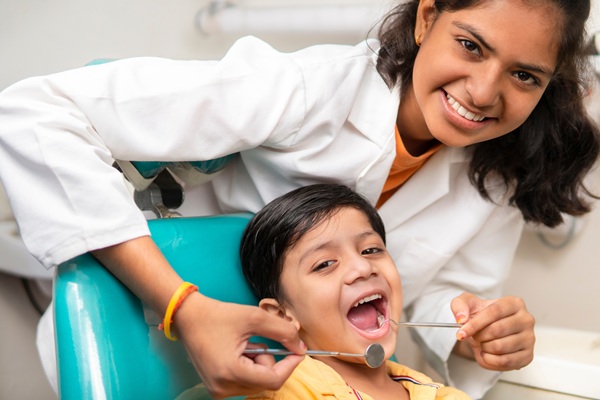Pediatric Dental Procedure – Pulpotomy and Baby Teeth

A pulpotomy is performed on baby teeth and is one of the more highly recommended pediatric dental procedures for dealing with severe tooth decay that has led to an infected dental pulp in the root of the tooth. A pulpotomy is often necessary to save a decayed baby tooth (especially molars) from falling out early.
Pulpotomy: what is it and how can it save baby teeth?
Although it can sound intimidating, a pulpotomy is a minimally invasive procedure that should not cause too much discomfort for your child. The following is a discussion on what a pulpotomy is and how the pediatric dental procedure can help save baby teeth from becoming lost.
What is pulpotomy?
A pulpotomy is a dental procedure performed to save a tooth that is severely damaged by decay. A pulpotomy may be recommended if the decay has extended toward the root of the tooth and the dental pulp has become infected. This procedure is most notably performed on children who still have their baby teeth and whose tooth roots have not yet fully matured. Subsequently, a pulpotomy is often referred to as a “baby root canal.”
When is a pulpotomy necessary?
A pulpotomy may be necessary if the dental pulp of a child’s primary tooth (especially baby molars) becomes infected or decayed. If left untreated in these instances, then the decay or infection may continually spread and reach further down the root of the tooth, leading to the need for treatments that are more extensive than a pulpotomy. A pediatric dentist can determine if a pulpotomy is necessary during a consultation visit.
Pulpotomy vs. pulpectomy: what is the difference?
A pulpotomy and a pulpectomy are very similar. The primary difference, however, is that a pulpotomy only removes dental pulp in the tooth’s crown, and it leaves dental pulp that is closer toward the root of the tooth. A pulpectomy removes all dental pulp. A pulpectomy is naturally more extensive and may require a dental specialist to perform.
Pulpotomy vs. tooth extraction for baby teeth
A common misconception many parents have is that certain pediatric dental procedures such as a pulpotomy are not necessary for baby teeth since they are not going to last long-term anyway. However, baby teeth serve an important purpose and allow for the optimal development of permanent teeth. If baby teeth fall out or are unnecessarily extracted early, then it could affect the development of permanent teeth. Subsequently, when possible, pediatric dentists typically recommend a pulpotomy rather than a tooth extraction. However, if the tooth is beyond saving, then extraction may be the best option.
Discuss pediatric dental procedure options with a pediatric dentist
Our pediatric dentist can help children through the pulpotomy process, ensuring they feel as comfortable and calm as possible every step of the way. If your child has symptoms such as severe tooth decay, deep tooth pain and sensitivity, and gum swelling, then call our pediatric dentist today to schedule a prompt visit to deal with the concern.
Request an appointment here: https://novapedsdentistry.com or call Nova Pediatric Dentistry at (201) 812-2952 for an appointment in our Dumont office.
Check out what others are saying about our services on Yelp: Pulpotomy in Dumont, NJ.
Recent Posts
Composite fillings are a popular choice for treating cavities in children's teeth. These fillings consist of tooth-colored resin that blends seamlessly with natural teeth, making them an ideal option for those who want both functional and aesthetic solutions. Composite fillings are especially beneficial for children as they offer a durable, effective, and visually appealing way…
A kid friendly dentist understands the importance of creating a welcoming and comfortable environment tailored to young patients' needs to help alleviate the child's stress or anxiety. Establishing positive dental experiences early on is not just about the present, but it also ensures children develop healthy oral hygiene habits that last a lifetime. Learn the…
Infants can benefit from seeing a pediatric dentist when primary teeth begin to erupt. Primary teeth are placeholders for permanent teeth and should receive the same attention, including appropriate home care.Primary teeth are crucial to a baby's health and development. Therefore, dentists encourage parents to begin an infant's oral hygiene routine as soon as possible…
Going to an emergency pediatric dentist can give your child immediate dental needs. Treating urgent dental issues can provide relief right away. It can also prevent complications. Here are the necessary steps that you can take even before the drive to your emergency pediatric dentist.Showing distress will only intensify the child’s anxiety. This will make…


